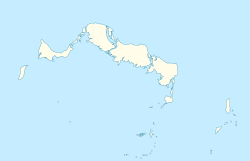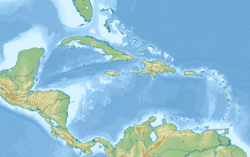East Caicos facts for kids
|
The location of East Caicos within the Turks and Caicos Islands
|
|
| Geography | |
|---|---|
| Location | Atlantic Ocean |
| Coordinates | 21°42′09″N 71°29′53″W / 21.70250°N 71.49806°W |
| Archipelago | Lucayan Archipelago |
| Administration | |
| British Overseas Territory | Turks and Caicos Islands |
| Additional information | |
| Time zone | |
| • Summer (DST) | |
| ISO code | TC |
| Official name: North, Middle & East Caicos Islands | |
| Designated: | 27 June 1990 |
| Reference #: | 493 |
East Caicos is the fourth largest island in the Turks and Caicos Islands. It is located in the Atlantic Ocean. This island is special because no one lives there today.
To its west, a narrow waterway called Lorimer Creek separates East Caicos from Middle Caicos. Only small boats can pass through this creek. To the south, you'll find South Caicos.
Contents
Exploring East Caicos's Geography
East Caicos is part of the South Caicos and East Caicos District. The island covers about 90.6 km2 (35 sq mi) of land. If you include the shoreline, its total area is around 182 km2 (70 sq mi).
The island is full of natural beauty. You can find many ponds, lakes, swamps, and areas covered with mangroves. These wet places are home to many birds, like flamingos, wild ducks, and pigeons.
Highest Point and Unique Landscapes
East Caicos is home to Flamingo Hill, which is the highest point in all of the Turks and Caicos Islands. It stands about 156 ft (48 m) tall.
On the north side of the island, you'll see wide, grassy areas called savannas. In the northwest, there's a system of caves. Long ago, people mined bat guano (bat droppings) from these caves. Inside, you can also find ancient rock carvings called petroglyphs. These carvings are proof that people lived on East Caicos a very long time ago.
The Rich History of East Caicos
About 500 years ago, the island was home to the Lucayan people and the Taíno people. They called the island Wana, which means 'Small Country'.
Life in the 19th Century
In the 1800s, East Caicos was a busy place. There was a large farm that grew sisal, a plant used to make ropes and fabrics. The island also had a successful cattle industry.
Today, East Caicos is uninhabited. The only things left from its past are the cave paintings, the ruins of a town called Jacksonville, and an old, abandoned railway.
Shipwrecks and Freedom
In 2004, a team of underwater archaeologists found the remains of a ship near the island. This area was known for shipwrecks. Two Spanish ships, the Enterprize and the Trouvadore, sank here in 1837 and 1841.
When the Trouvadore sank, 192 captive Africans survived. British colonists helped these survivors become free people. Most of them settled on Grand Turk Island, and 24 went to Nassau.
See also
 | James Van Der Zee |
 | Alma Thomas |
 | Ellis Wilson |
 | Margaret Taylor-Burroughs |




